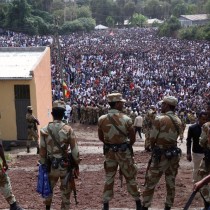
East Africa: Crackdowns on Protests, Free Expression
"East African governments showed little regard for the basic rights of their citizens to free expression and assembly in 2016,” said Maria Burnett, associate Africa director at Human Rights Watch. "Ethiopia’s brutal clampdown on unprecedented protests was an appalling low point for the region.”
In the 687-page World Report, its 27th edition, Human Rights Watch reviews human rights practices in more than 90 countries. In his introductory essay, Executive Director Kenneth Roth writes that a new generation of authoritarian populists seeks to overturn the concept of human rights protections, treating rights as an impediment to the majority will. For those who feel left behind by the global economy and increasingly fear violent crime, civil society groups, the media, and the public have key roles to play in reaffirming the values on which rights-respecting democracy has been built.
Governments throughout the region routinely failed to investigate serious abuses by state security forces, cutting off avenues of redress for victims, Human Rights Watch said. In Ethiopia, state security forces violently suppressed widespread protests against government policies, killing hundreds of people and detaining tens of thousands. The government later imposed a far-reaching state of emergency, restricting basic rights, following a stampede at a cultural festival triggered by the government’s response to the large crowds. The Ethiopian government has failed to meaningfully investigate the killings of protesters and other abuses.
In Kenya, security forces forcibly disappeared at least 34 people over the past two years during counterterrorism operations in northeastern Kenya and Nairobi. Two were eventually released, though one of those has been charged with terrorism. Ugandan police and army personnel killed at least 13 people during alleged arrest attempts in law enforcement operations in the western Rwenzori region. In Somalia, politically motivated violence took a heavy toll on civilians.
Conflict and persecution in South Sudan, Somalia and Burundi, among other countries, prompted East African countries to host hundreds of thousands of refugees with mixed results. While Uganda has worked to find ways to integrate refugees, the Kenyan government violated its commitments under international refugee law by announcing the closure of the Dadaab refugee camp, predominantly inhabited by Somali refugees. The decision forced thousands of Somali refugees to return home, despite ongoing armed conflict there, and left those remaining in fear for their safety and future.
Government-orchestrated threats and violence directed at the media remains rife throughout East Africa. Several independent journalists in Eritrea have been in solitary detention since September 2001. None have been brought to trial and no independent newspapers operate there. Ethiopia also detained journalists and bloggers, often under the Anti-Terrorism Proclamation, and many remain in detention. The Ethiopian government restricted access to diaspora television stations and jammed the signals of international radio stations like Deutsche Welle and Voice of America.
In Somalia, federal and regional authorities and the Islamist armed group Al-Shabab carried out targeted attacks on media, including harassment, and intimidation. At least two journalists were killed in targeted attacks. In May, a Kenyan court declared a section of the Information and Communications Act that police had used to arrest and charge journalists unconstitutional.
During Uganda’s 2016 elections, government officials and police arrested and beat over a dozen journalists – in some cases during live broadcasts. At least eight Kenyan journalists and bloggers were arrested and charged under vaguely worded provisions in new laws. In both Ethiopia and Uganda, at times of heightened criticism of the government, the authorities blocked access to the internet and social media networks, saying that it was necessary for "security reasons.”
In some instances, governments or national courts took positive steps to improve avenues for redress for victims of human rights abuses. The president of Somalia signed a law establishing a national human rights commission that can receive complaints and monitor prisons and unlawful detention facilities. Monitors should be able to visit prisons unannounced. In Uganda, the Constitutional Court ruled unconstitutional a provision of the Equal Opportunities Commission Act that permitted the commission to reject complaints from people considered "immoral or socially unacceptable” by the majority.
"In the name of security, patterns of abusive response have spread across East Africa, further alienating many already marginalized communities,” Burnett said. "Governments in the region and their international partners should rein in abusive forces and make accountability and tolerance for divergent views a priority.”
Source-Human Rights WatchLeave a comment
| Copyright © 2009 - 2024 Sunatimes News Agency All Rights Reserved. |
| Home | About Us | Diinta | Reports | Latest News | Featured Items | Articles | Suna Radio | Suna TV | Contact Us |
 0
0 









East Africa: Crackdowns on Protests, Free Expression
(Nairobi) – Clampdowns by governments in East Africa on peaceful protests and free expression severely threatened human rights in the region in 2016, Human Rights Watch said today in its World Report 2017.